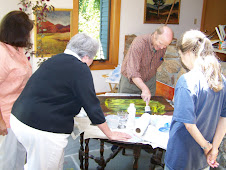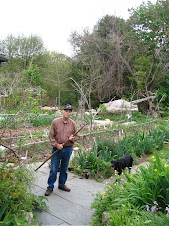Ned was working on five books these last years. One was called "How to Help Your Wife." Another was how to design your own home. He was writing an autobiography and working on a collection of his articles about schools and learning.
This last book has several possible titles: School Is Hell; Racoon Hands; A Dangerous Man. Our friend Bruce Thomas wrote the following introduction to the book.
Let’s say that institutionalized schooling (call it School) has colonized learning. Here’s a thought experiment combined with time travel: Superimpose School on a 17th century band of Lakotas. What you’d have for young braves is a syllabus of courses like “Prairie Craft 203: Crawling across the grass downwind of the buffalo”; or Basic Bow and Arrow 235, subdivided into subunits like 235-C: Arrow Pointing and Release.” And so on. The courses would be taught by special teachers brought onto the tribal grounds solely for course instruction, such courses based on a filleting of the wholeness of buffalo hunting into neat skill slices. None of the instructors has ever actually engaged in buffalo hunts but each had taken the requisite courses given by buffalo hunt virgins who had themselves been certified by other buffalo hunt virgins. Young braves who failed to pass 70% of their courses would be classified as tribal defects and expected to slink away from the encampment in the dead of night. (The slow descent of the tribe into starvation resulting from buffalo hunt failure would go—as an exercise in pedagogical tact-- unrecorded in the annals.)
Learning is what people do. School is what is done to them. Happily, sometimes the two intersect. But, these days, not very often. Education is very solemn, very big business, very big politics. So the still small voice saying “ Hey, wait a minute, what’s going on here?” doesn’t get much of a hearing.
Ned Vare is one of those voices. I need to make the usual admissions here. I’ve known Ned since 1969. I am not objective. But who the hell wants to be objective about children? The single most important ingredient in a happy childhood is at least one adult who is irrationally committed to that child. Irrationally committed. I remember very clearly when I got hold of this insight. I was at a playground with my daughter and there was a mother there with her child. Her child was a royal pain in the ass: willful, stubborn, loud. The mother serenely abided the widely varying contours of her daughter’s behavior and, when playground time was over, she scooped daughter up in her arms and took off for home. I left the playground confident that the willful child would , in the course of time, and within the irrational embrace of an unwavering parental commitment, grow up into a reasonably decent human being.
Schooling, by the severest of contrasts, is a triumph of rationality, the Mount Everest of tidiness. It defines when children start formal learning. It organizes them into groups defined by age. It defines what they should know and be able to do at each age. It has tests that purport to reveal what they know and can do at each age. It works basically like a passenger railroad. Children are loaded into a car marked first grade. (Other children are loaded into cars marked 2nd through 8 th grades). The train pulls out of the station and into a tidy curricular landscape. The teaching conductor in each car calls the children’s attention to what they must learn from the landscape; periodically the testing conductor comes through to conduct the assessment that determines whether or not the children will pass onto the 2nd grade car. In the best of all possible worlds, all the children move along yearly until they reach the 8th grade car, where they receive a diploma (wearing gown and cap) that enables them to pass on to another railroad line called high school.
And so it goes. It’s unassailably logical. It’s also utterly crazy. Ned calls attention to the craziness. Although he will occasionally finger a specific individual for some particularly egregious piece of silliness, his focus is for the most part on the systemic craziness. He has always been wont to say that everybody is doing the best he can. I think it is fair to say that his “everybody” includes schoolteachers. What he writes about is a system that is a triumph of adult rationality. But the logic of childhood is emphatically not the logic of adulthood. The learning of children is not linear, not sequential, not conformable to external timetables. It is driven by passions and engagements. It is often not predictable and most of the time it is not captured by adult measurements—particularly the kinds of learning that entail real and durable understanding.
Ned’s voice is thus the voice of dissent and the origins of such dissent is always an interesting question. By dissent I mean fundamental disagreement with some societal fundamental. I have a hypothesis (i.e., a theory in short pants) about the origins of Ned’s voice of dissent. The hypothesis comes in three parts. The first part is a basic state of cosmic pissed offness. How it comes about, I do not know. Some are born to it, others bred to it. Whatever its origins, it can exist in a condition of latency until it gets activated by a trigger, which is often some specific event.
In Ned’s case the trigger may have been an event early in his post-Yale career, when he was teaching elementary school in New Hampshire. There was in the school a boy whom we would now understand to be autistic. He was ill-treated by the other children. But by Ned as well, as he recalls it: “”That boy had every reason to hate everyone there for the way they treated him. Including me. We didn’t know what to do with him. That’s one of the things I am deeply ashamed of, still today. I was 23 then, I’m now 74 and I’m still more than ever ashamed of the treatment he got at our hands.”
What got activated, I think, was a sense of how justice relates in a profound way to childhood. George Dennison in The Lives of Children is one of the few to have written about the relation of justice to the lives of children generally and to their lives in school specifically. Anyone with a reasonably unimpaired memory of his/her own childhood will recall that constant refrain from childhood: “That’s not fair!”
The third item in the recipe for dissent is the Authorizing Text. The text usually is written—an article, a book, a speech. But it can also be a live voice. In Ned’s case I suspect it was both. The written text was that of John Holt (How Children Learn, How Children Fail). Just around the time America was getting into its Cold War snit about the state of American education, Holt was coming out with books that fingered School as a major impediment to learning. Holt’s voice was supplemented by that of the woman who was to become his wife, Luz, a disillusioned teacher. The two together had the effect of completing the process by which Ned became a voice of dissent in the matter of School.
Peggy Clifford, who has been a friend of Ned longer than I, has written a précis of his life that in its few deft words of portraiture goes a fair distance toward explaining what it is that gives these pages their distinctive heft and pitch. I end with her words:
Ned has spent his life learning—how to paint, how to design and make furniture, how to play golf (even though his mother was arguably the greatest woman golfer in the world—enough to discourage any red-blooded American boy from even looking at a golf club), how to run a ranch, how a golf swing works (it’s a spiral, not a circle). So when a man who has spent his life learning spends ten years learning how school does what it does to people, and why, the result is apt to be explosive and revelatory.
Monday, September 7, 2009
Subscribe to:
Post Comments (Atom)
























I was diagnosed with IPF four years ago, and after prescription treatments didn’t help, I tried an herbal program from NaturePath Herbal Clinic. Over the following months, I felt my breathing and energy improve and started to feel more like myself again. This was my personal experience. More information is available at www.naturepathherbalclinic.com.
ReplyDeleteinfo@naturepathherbalclinic.com